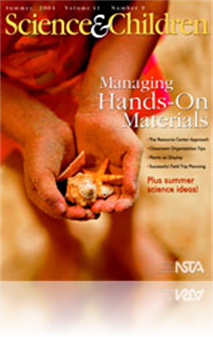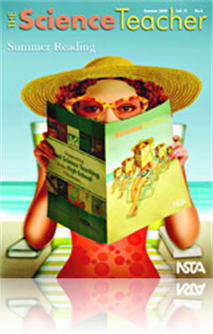All Resources
Journal Article
This selection includes thoughts from the Field Editor of Science and Children related to better organization. Some of the suggestions in this issue are not intended for a single teacher but, a single teacher may lead the charge. ...
Journal Article
Is a Materials Resource Center Right for You?
Well run science materials centers can be a vital part of an exemplary science instruction program. The author introduces the “Five Ss” of successful materials support—Service, Space, Staff, Stuff, and Savings—and encourages administrators an...
Journal Article
Lab notebooks and field journals are essential tools for scientists. Quite often science journals contain so many drawings that they begin to resemble an artist’s sketchbook. Journals, notebooks, and sketchbooks are all systems that make meaning po...
Journal Article
Teaching Through Trade Books: Meet the Decomposers
This month's Teaching Through Trade Books column focuses on three books about decomposers: Compost Critters, A Pill Bug’s Life, and A Slug's Life. Activities for grades K-3 and 4-6 help children learn about animals’ basic needs and the process of...
Journal Article
Through summer reading, teachers can spend valuable hours updating content background methods, or simply refreshing their spirit. NSTA Recommends, the association’s premier review system for science education, highlights books that have the potenti...
Journal Article
Science Sampler: Science magic -- Making a difference
The author recalls with fondness her sixth grade science teacher, Mr. M, and how he transformed an otherwise turbulent year into “magic” by cultivating her love of science through the process of scientific inquiry, and by taking a personal inte...
Journal Article
Nearly everything that we do each day is connected in some way to Earth--to its land, oceans, atmosphere, plants, and animals. To fully understand and appreciate our planet, students need to learn about its processes, its resources, and its environm...
Journal Article
Home Connections: 'Round and 'Round
Summer is coming. Hot weather means sandals, ice cream, pool parties, and occasionally really large thunderstorms. Sometimes really powerful thunderstorms produce tornadoes. Tornadoes are the most violent kind of storm and can be extremely dangero...
Journal Article
In this month’s column, Editor Lester G. Paldy says farewell to the Journal of College Science Teaching (JCST) with the same “panache” as the distinguished New York Times columnist, Anthony Lewis, whom he admired. He reflects on his early y...
Journal Article
After the bell: Drop by drop, liter by liter
How is water used in your home? Most people don't realize the number of times they use an appliance that relies on water. Since water is one of the most important substances for organisms on Earth, it is evident from our reliance on this natural reso...
Journal Article
Scope on the Skies: Summer astronomy
Re-visit the summer of 2004 by discovering its celestial events and learning about the Cassini/Huygens spacecraft activity that also occurred that year--which has implications today as it continues to orbit the Saturnian system until 2008, through th...
Journal Article
Trial by Science: A Forensic Extravaganza
This intriguing crime-solving activity for middle level students demonstrates some of the basics of forensic science; including the analysis of fingerprints, hair, fiber, and soil evidence. The realism of the scenario is enhanced by recruiting adult ...
Journal Article
Teaching Failure in the Laboratory
Many undergraduate science students are misled by “cookbook” laboratory experiments that make science appear to be easy and to always yield anticipated results. This is a direct consequence of the pedagogical approach normally used in science tea...
Journal Article
The author used a repeated-measures design to compare students’ exam performance after their participation in a cooperative concept-mapping workshop in contrast to their exam performance after more traditional assignments. Cooperative concept-mappi...
Journal Article
Peer leaders play a key role in the success of the peer learning teaching method. In this article, we discuss the effect team learning has had on peer leaders in chemistry and biology classes over the course of four years at the University of Portlan...









